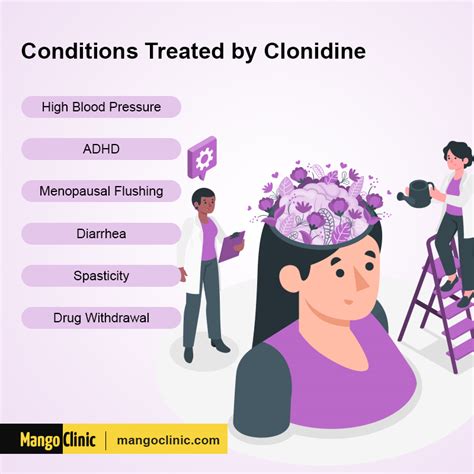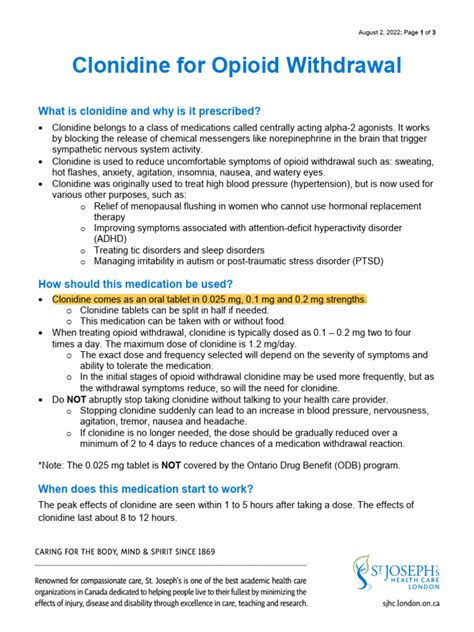Intro
Discover how Clonidine treats high blood pressure, lowering hypertension with its alpha-2 adrenergic agonist properties, reducing cardiovascular risks and symptoms.
High blood pressure, also known as hypertension, is a common condition that affects millions of people worldwide. It occurs when the force of blood against the walls of the arteries is too high, which can lead to serious health problems such as heart disease, stroke, and kidney disease. One of the medications used to treat high blood pressure is clonidine. In this article, we will delve into the world of clonidine, its benefits, working mechanisms, and potential side effects.
Clonidine is a medication that has been used for decades to treat high blood pressure. It belongs to a class of medications known as centrally acting alpha-2 adrenergic agonists. Clonidine works by stimulating certain receptors in the brain, which in turn reduces the production of certain chemicals that constrict blood vessels. This leads to a decrease in blood pressure, making it easier for the heart to pump blood throughout the body. Clonidine is often prescribed to patients who have not responded well to other blood pressure medications or have certain medical conditions, such as kidney disease or heart failure.
The importance of managing high blood pressure cannot be overstated. Untreated high blood pressure can lead to serious health problems, including heart attack, stroke, and kidney failure. According to the American Heart Association, high blood pressure is the leading cause of death worldwide, accounting for over 360,000 deaths per year in the United States alone. By controlling high blood pressure, individuals can significantly reduce their risk of developing these serious health problems. Clonidine, as a medication, plays a crucial role in helping individuals manage their high blood pressure and reduce their risk of developing related health problems.
How Clonidine Works

Benefits of Clonidine
The benefits of clonidine are numerous. Some of the most significant benefits include: * Reduced blood pressure: Clonidine has been shown to be effective in reducing blood pressure in individuals with high blood pressure. * Reduced heart rate: Clonidine can help to reduce the heart rate, which can help to reduce the workload on the heart. * Reduced risk of heart attack and stroke: By reducing blood pressure and heart rate, clonidine can help to reduce the risk of heart attack and stroke. * Improved kidney function: Clonidine can help to improve kidney function in individuals with kidney disease.Side Effects of Clonidine

Precautions and Warnings
Clonidine can interact with certain medications, including: * Beta blockers: Clonidine can interact with beta blockers, which can increase the risk of low blood pressure. * Calcium channel blockers: Clonidine can interact with calcium channel blockers, which can increase the risk of low blood pressure. * Diuretics: Clonidine can interact with diuretics, which can increase the risk of low blood pressure.Clonidine Dosage

Clonidine and Pregnancy
Clonidine can be used during pregnancy, but it is essential to consult the doctor before taking the medication. Clonidine can pass into breast milk, so it is essential to consult the doctor before breastfeeding.Clonidine and Other Medical Conditions

Clonidine and Lifestyle Changes
While clonidine can be effective in reducing blood pressure, it is essential to make lifestyle changes to manage high blood pressure. Some of the lifestyle changes that can help to reduce blood pressure include: * Exercise: Regular exercise can help to reduce blood pressure and improve overall health. * Diet: Eating a healthy diet that is low in salt and fat can help to reduce blood pressure. * Stress reduction: Reducing stress through techniques such as meditation and yoga can help to reduce blood pressure.Clonidine and Interactions with Other Medications

Clonidine and Overdose
Overdosing on clonidine can be serious and even life-threatening. Symptoms of overdose include: * Drowsiness: Overdosing on clonidine can cause excessive drowsiness, which can be a problem for individuals who need to be alert during the day. * Confusion: Overdosing on clonidine can cause confusion, which can increase the risk of accidents and injuries. * Slow heart rate: Overdosing on clonidine can cause a slow heart rate, which can increase the risk of heart failure.Clonidine and Withdrawal

Clonidine and Monitoring
It is essential to monitor blood pressure and heart rate regularly while taking clonidine. The doctor may also need to monitor kidney function and liver function regularly.What is clonidine used for?
+Clonidine is used to treat high blood pressure, ADHD, anxiety, and pain.
What are the side effects of clonidine?
+The side effects of clonidine include drowsiness, dry mouth, constipation, and dizziness.
Can clonidine be used during pregnancy?
+Clonidine can be used during pregnancy, but it is essential to consult the doctor before taking the medication.
Can clonidine interact with other medications?
+Yes, clonidine can interact with other medications, including beta blockers, calcium channel blockers, and diuretics.
What should I do if I miss a dose of clonidine?
+If you miss a dose of clonidine, take it as soon as you remember, unless it is almost time for your next dose.
We hope this article has provided you with a comprehensive overview of clonidine and its uses. If you have any questions or concerns about clonidine or high blood pressure, please do not hesitate to reach out to your doctor or healthcare provider. Remember to always follow the dosage instructions provided by your doctor and to monitor your blood pressure and heart rate regularly while taking clonidine. By working together with your healthcare provider, you can effectively manage your high blood pressure and reduce your risk of developing related health problems. Share this article with your friends and family to help spread awareness about the importance of managing high blood pressure and the role that clonidine can play in this process.
